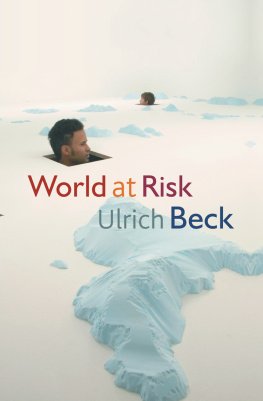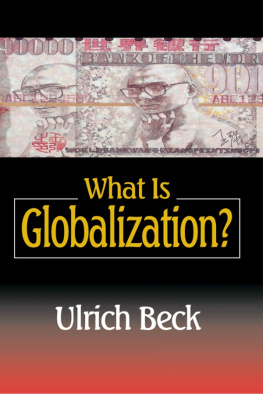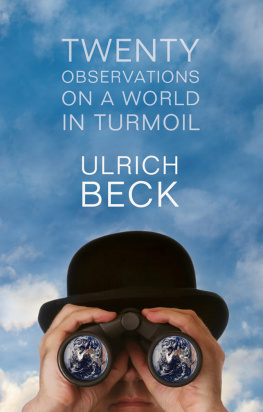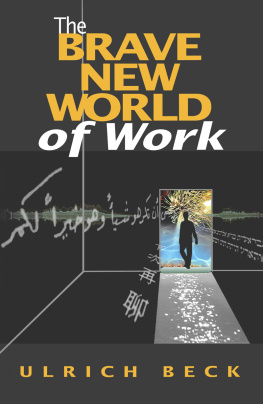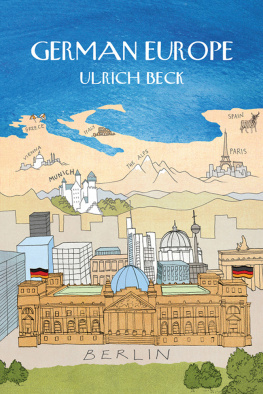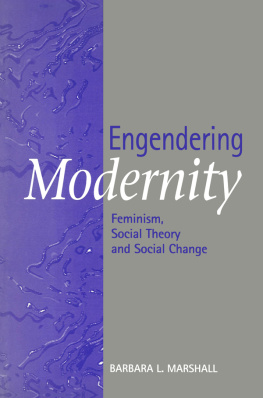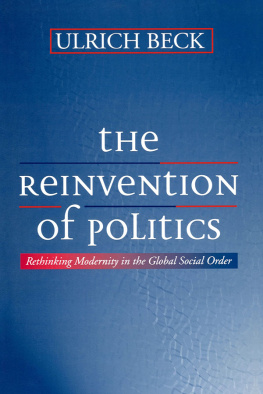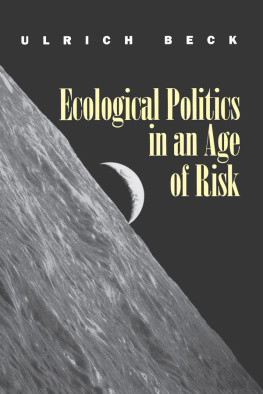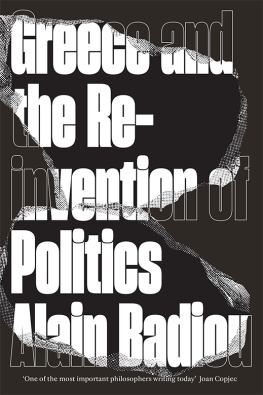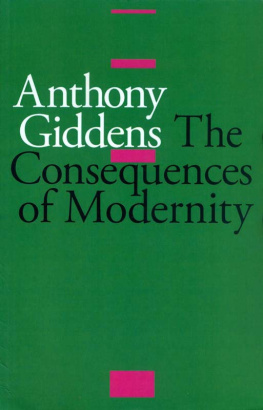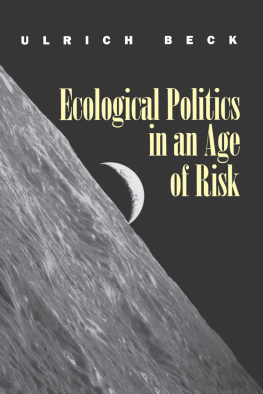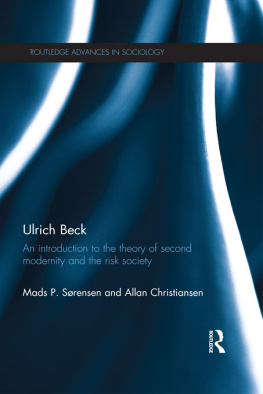
Contents

English translation Polity Press 1997
First published in German as Die Erfindung des Politischen
Suhrkamp Verlag 1993. Chapter 1 first published in German as
Das Zeitalter der Nebenfolgen und die
Politisierung der Industriegesellschaft
Suhrkamp Verlag, Frankfort am Main 1996.
All rights reserved.
This translation first published in 1997 by Polity Press in association with Blackwell Publishers Ltd.
Reprinted 2005
Published with the financial support of Inter Nationes, Bonn.
2 4 6 8 10 9 7 5 3 1
Polity Press
65 Bridge Street
Cambridge, CB2 1UR, UK
Polity Press
350 Main Street
Malden, MA 02148, USA
All rights reserved. Except for the quotation of short passages for the purposes of criticism and review, no part of this publication may be reproduced, stored in a retrieval system, or transmitted, in any form or by any means, electronic, mechanical, photocopying, recording or otherwise, without the prior permission of the publisher.
Except in the United States of America, this book is sold subject to the condition that it shall not, by way of trade or otherwise, be lent, re-sold, hired out, or otherwise circulated without the publishers prior consent in any form of binding or cover other than that in which it is published and without a similar condition including this condition being imposed on the subsequent purchaser.
ISBN 0-7456-1366-7
ISBN 0-7456-1758-1 (pbk)
A CIP catalogue record for this book is available from the British Library and the Library of Congress.
For further information on Polity, visit our website: www.polity.co.uk
For my Mother
Introduction
There is an essay by Wassily Kandinsky (1982) with the peculiar title And. In it, Kandinsky inquires as to the word that characterizes the twentieth century in contrast to the nineteenth century. His surprising answer is that, while the nineteenth century was dominated by Eitheror, the twentieth was to be devoted to work on And. Formerly: separation, specialization, efforts at clarity and the calculability of the world; now: simultaneity, multiplicity, uncertainty, the issue of connections, cohesion, experiments with exchange, the excluded middle, synthesis, ambivalence.
The vagueness of And is the theme of the latter world, which is ours. Its farewell to order, its overflowing chaos, its extravagant hope for unity, its helplessness in the face of merely additive growth, its limits and limitlessness, the increasingly illusive borders and the anxiety that they arouse all that lures and thrills in And. The Eitheror does not really terminate in the inconclusiveness, one could even say the undifferentiated mercifulness, of And. If so, then only imperfectly, vaguely and dangerously. Certainly, the irredeemable globality of the world speaks in favour of And. The And even worms its way through the armed borders, but this only makes the dangers general and indefensible.
Every new era of political existence has its key experience. The monarchs divinity under law, his divine right, ended with the storming of the Bastille in 1789, and democracy, the rule of the people within the boundaries of the nation state, began its increasingly questionable triumphal march. Two hundred years later, the breakthrough of And is characteristically announced by two experiences: the reactor disaster in Chernobyl and the collapse of the Berlin Wall. In the first, the Eitheror institutions of industrial society and their claims to exercise control and provide security are being refuted by the global risk society. In the second, the Eitheror categories of EastWest and leftright have collapsed as well.
Precisely because the second fundamental experience of And, in Kandinskys sense, flew by so quickly, it is important to preserve it in memory. Communism was not swept from the world-historical stage by brutal force, nor with bound hands in front of a firing squad, nor in some blood-soaked big bang. It disappeared like a nightmare upon waking, like a fairy tale in reality.
The year 1989 was just coming to an end, writes Peter Handke,
a year in which, from day to day and from country to country, so many things seemed to be changing, and with such miraculous ease, that he imagined that someone who had gone for a while without hearing the news, voluntarily shut up in a research station or having spent months in a coma after an accident, would, upon reading his first newspaper, think it was a special joke edition pretending that the wish dreams of the subjugated and separated peoples of the continent had overnight become reality. This year, even for him, who had a background devoid of history, and a childhood and youth scarcely enlivened, at most hindered, by historic events (and their neck-craning celebrations), was the year of history: suddenly it seemed as if history, in addition to all its other forms, could be a self-narrating fairy tale, the most real and realistic, the most heavenly and earthly of fairy tales now that history was apparently moving along, day after day, in the guise of the great fairy tale of the world, of humanity, weaving its magic (or was it merely a variant on the old ghost story?). (Handke 1994: 57f)
Nineteen eighty-nine was the year of And. The dancing at the Berlin Wall symbolizes the peaceful revolution of And, starting from nowhere and unexplained, unexplainable, to this day. If the borders in Europe that had fallen away are now being reconstructed, invoked and reflagged, this still remains a reaction a reaction to the sheer intolerability of And.
The global, diffuse and formless character of And is upsetting to many people. The dis-alienation of the alien and the concomitant dis-possession of that which is ones own, both involuntarily produced by the age of And, are experienced as a threat. Without Eitheror, they say, they cannot live and, they add, cannot even conceive of the And. So And is by no means the beginning of paradise on earth. Circumstances of a completely new type are probably beginning here. The world of Eitheror in which we think, act and live is becoming false. In one way or another, this is the beginning of conflicts and experiments beyond Eitheror, or, in the terms of this book, the reinvention of politics.
A book that has as many versions and facets as this has flown under a number of flags in its journey. It set off as Beyond Left and Right, and that is how it was announced. Now it has the proud and controversial title The Reinvention of Politics, to which should be added after the end of the EastWest conflict order. The title could also have been short and simple: And. If I lacked the courage to do this, then it was because the book is even less able to meet this expectation.
The book circles around the difference between two epochs of modernity simple or industrial versus reflexive modernity, which is now coming into view and calling for the reinvention of politics. If one wanted to simplify and condense to the greatest possible degree the assessment which is tied up with this, one could use the words of Kandinsky: the age of and is destroying and replacing the age of eitheror. But as has been said, that would be too ambitious, perhaps too hopeful, even clairvoyant, exceeding even the powers of a frivolous sociologist. Yet it remains true; this tiny little word And with its modesty bordering on invisibility contains keys to new modernities.
Kandinsky published his essay in 1927 (see Kandinsky, 1982: 706). It is depressing how little has been contributed since then to the discovery and clarification of the riddles hidden in the three letters
Next page

